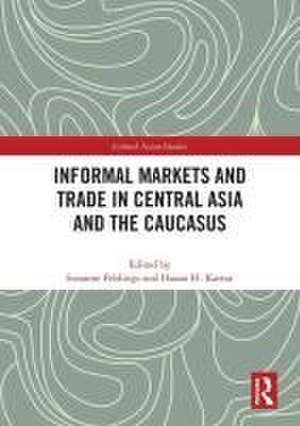Informal Markets and Trade in Central Asia and the Caucasus: Central Asian Studies
Editat de Susanne Fehlings, Hasan H. Karraren Limba Engleză Paperback – 29 ian 2024
Collectively, the book suggests that informality should be seen as a normative order for polities in Central Asia and the Caucasus for three reasons: (1) The inability – or unwillingness – of the states to measure commercial transactions. (2) The highly personalized nature of small business operations that rest on networking and social relations, oral agreements and trust. (3) Markets and bazaars being embedded within states in which clientelism frequently thrives.
This book is a significant new contribution to the study of trade and informal markets in Central Asia and the Caucasus, and will be a great resource for academics, researchers and advanced students of Sociology, History, Politics, Business, Economics, Social Anthropology and Geography.
The chapters in this book were originally published as a special issue of the journal, Central Asian Survey.
| Toate formatele și edițiile | Preț | Express |
|---|---|---|
| Paperback (1) | 382.75 lei 6-8 săpt. | |
| Taylor & Francis – 29 ian 2024 | 382.75 lei 6-8 săpt. | |
| Hardback (1) | 1000.27 lei 6-8 săpt. | |
| Taylor & Francis – 12 apr 2022 | 1000.27 lei 6-8 săpt. |
Din seria Central Asian Studies
-
 Preț: 379.30 lei
Preț: 379.30 lei -
 Preț: 339.60 lei
Preț: 339.60 lei -
 Preț: 324.35 lei
Preț: 324.35 lei -
 Preț: 348.59 lei
Preț: 348.59 lei -
 Preț: 394.08 lei
Preț: 394.08 lei - 12%
 Preț: 299.52 lei
Preț: 299.52 lei - 18%
 Preț: 1164.44 lei
Preț: 1164.44 lei -
 Preț: 407.52 lei
Preț: 407.52 lei - 26%
 Preț: 764.20 lei
Preț: 764.20 lei - 18%
 Preț: 1057.75 lei
Preț: 1057.75 lei - 28%
 Preț: 821.06 lei
Preț: 821.06 lei - 18%
 Preț: 1108.42 lei
Preț: 1108.42 lei - 13%
 Preț: 297.57 lei
Preț: 297.57 lei - 18%
 Preț: 1058.79 lei
Preț: 1058.79 lei - 14%
 Preț: 312.77 lei
Preț: 312.77 lei - 12%
 Preț: 299.52 lei
Preț: 299.52 lei - 18%
 Preț: 1056.35 lei
Preț: 1056.35 lei - 16%
 Preț: 260.93 lei
Preț: 260.93 lei - 18%
 Preț: 727.19 lei
Preț: 727.19 lei - 31%
 Preț: 765.84 lei
Preț: 765.84 lei - 18%
 Preț: 1218.34 lei
Preț: 1218.34 lei -
 Preț: 407.78 lei
Preț: 407.78 lei -
 Preț: 482.74 lei
Preț: 482.74 lei -
 Preț: 419.70 lei
Preț: 419.70 lei -
 Preț: 416.22 lei
Preț: 416.22 lei - 18%
 Preț: 1053.16 lei
Preț: 1053.16 lei - 15%
 Preț: 309.69 lei
Preț: 309.69 lei - 18%
 Preț: 1014.65 lei
Preț: 1014.65 lei -
 Preț: 436.14 lei
Preț: 436.14 lei - 18%
 Preț: 1057.05 lei
Preț: 1057.05 lei - 18%
 Preț: 1060.87 lei
Preț: 1060.87 lei - 26%
 Preț: 763.23 lei
Preț: 763.23 lei -
 Preț: 488.71 lei
Preț: 488.71 lei - 18%
 Preț: 1111.40 lei
Preț: 1111.40 lei - 18%
 Preț: 1057.05 lei
Preț: 1057.05 lei - 31%
 Preț: 767.47 lei
Preț: 767.47 lei
Preț: 382.75 lei
Nou
Puncte Express: 574
Preț estimativ în valută:
73.24€ • 76.68$ • 60.75£
73.24€ • 76.68$ • 60.75£
Carte tipărită la comandă
Livrare economică 09-23 aprilie
Preluare comenzi: 021 569.72.76
Specificații
ISBN-13: 9781032195827
ISBN-10: 1032195827
Pagini: 168
Dimensiuni: 174 x 246 mm
Greutate: 0.29 kg
Ediția:1
Editura: Taylor & Francis
Colecția Routledge
Seria Central Asian Studies
Locul publicării:Oxford, United Kingdom
ISBN-10: 1032195827
Pagini: 168
Dimensiuni: 174 x 246 mm
Greutate: 0.29 kg
Ediția:1
Editura: Taylor & Francis
Colecția Routledge
Seria Central Asian Studies
Locul publicării:Oxford, United Kingdom
Public țintă
Postgraduate, Undergraduate Advanced, and Undergraduate CoreCuprins
1. Negotiating state and society: the normative informal economies of Central Asia and the Caucasus 2. Trading in Dordoi and Lilo bazaars: frontiers of formality, entrepreneurship and globalization 3. The traders of Central Bazaar, Astana: motivation and networks 4. The formal side of informality: non-state trading practices and local Uyghur ethnography 5. Markets at sacred sites: the globalized mobility and informality of the Armenian religious fairs 6. The bazaar in ruins: rent and fire in Barakholka, Almaty 7. Doing business in Yabaolu Market, Beijing: (inter-)ethnic entrepreneurship, trust and friendship between Caucasian and Chinese traders 8. Business 2.0: Kyrgyz middlemen in Guangzhou 9. Trade ‘outside the law’: Uzbek and Afghan transnational merchants between Yiwu and South-Central Asia
Notă biografică
Susanne Fehlings is Senior Researcher at the Frobenius Institute for Research in Cultural Anthropology, Frankfurt am Main. Her regional focus is the Caucasus. She specializes in urban and economic anthropology, the anthropology of the state, and research on bazaars, trade activity and entrepreneurship.
Hasan H. Karrar is Associate Professor and Department Chair, Department of Humanities and Social Sciences at the Lahore University of Management Sciences, Pakistan. He is a specialist of China and Central Asia with a special interest in new economic and political linkages since the Cold War.
Hasan H. Karrar is Associate Professor and Department Chair, Department of Humanities and Social Sciences at the Lahore University of Management Sciences, Pakistan. He is a specialist of China and Central Asia with a special interest in new economic and political linkages since the Cold War.
Descriere
This book illustrates how informal markets and trade in Central Asia and the Caucasus have provided space for millions of people across the region to negotiate changes in state and society in the three decades since the breakup of the Soviet Union and the emergence of successor states.
